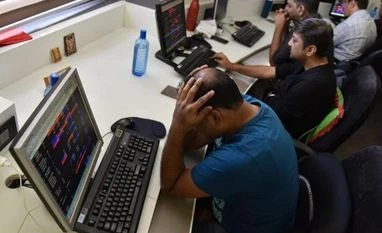The global rout triggered by the spread of coronavirus hit the Indian markets hard on Friday, with the benchmark indices suffering their worst single-day decline in five years. Taking a cue from the near 5 per cent fall in the Dow Jones index of the US, the domestic markets opened gap down and witnessed selling pressure throughout the day.
The Sensex dropped 1,448 points, or 3.6 per cent, to end at 38,297 — the lowest close since October 14, 2019 — while the Nifty plunged 432 points, or 3.7 per cent, to close at 11,202, breaching key support levels.
The rupee fell nearly 0.9 per cent to end at 72.17 against the US dollar — the lowest level for the domestic currency in seven months.
All the sectoral indices of the BSE and all Sensex components, with the exception of one, ended with losses on Friday. The Sensex ended the week with a 7 per cent loss, its worst weekly setback since December 2009, with about Rs 12 trillion of investor wealth being destroyed.
The Dow was down about 500 points, or 1.9 per cent, as of 11:50 pm on Friday.
The World Health Organization (WHO) warned that coronavirus had reached pandemic potential, prompting governments to assess the impact of the contagion on economies and corporate profitability.
As of Friday, more than 83,000 people, in at least 53 countries, have been infected by the dreaded virus. In the past few days, more cases have been reported outside China. The unabated spread of coronavirus has forced Japan to close its schools for a month. Iran, where top officials contracted coronavirus, cancelled Friday prayers in many cities, and Saudi Arabia barred pilgrims from its holiest sites.
Brent crude fell 12 per cent over the past week and ended the week at $50.8 per barrel.
“Last time, we had a virus like this was the SARS crisis in 2003, and that was short-lived. The reason for that was China was not as big an economy as it is today, it was not as embedded in global supply chain, and the size of global trade it had was smaller. Even if the spreads are contained, restoring normalcy and confidence will take months,” said Shankar Sharma, founder and vice-chairman, First Global.
Many brokerages have lowered their earnings forecasts after pencilling in lower global growth in the coming quarters.
"The spread of the coronavirus has the potential to take the markets down further materially. If the outbreak is more prolonged, it will have a big impact on global economic activity. However, if it is contained with shortly, the risk-reward is very attractive after the latest correction,” said Gautam Chhaochharia, head of India research, UBS. Most global markets fell around 3 per cent. The US market fell 4.4 per cent on Thursday. When the Indian markets were open, the US futures trading indicated another lower opening on the Wall Street.
"Today, we are not sure whether this spread will come to an end soon or end up as a pandemic. And that's why there is so much nervousness in the market. The virus is spreading quite fast compared to other outbreaks we have seen in the recent past. Most of them ended up being localised somewhere whereas this disease has spread across the globe," said Jyotivardhan Jaipuria, founder, Valentis Advisors.
Metal and IT stocks declined the most, with their sectoral indices dropping 7.1 per cent and 5.6 per cent, respectively. Analysts said broad-based selling was witnessed in these two sectors given their global exposure. Tech Mahindra, Tata Steel and M&M were the worst-performing Sensex stocks, declining over 7 per cent each.
On an overall basis, 2,011 stocks declined, and 456 advanced on the BSE. FPIs on Friday sold shares worth Rs 1,428 crore, extending their weekly selling to nearly Rs 11,198 crore. Buying by domestic institutional investors was strong on Rs 7,621 crore. Analysts said withdrawals by FPIs include passive fund outflows and those who withdrew from India to cover their redemption in neighbouring markets.
Unlock 30+ premium stories daily hand-picked by our editors, across devices on browser and app.
Pick your 5 favourite companies, get a daily email with all news updates on them.
Full access to our intuitive epaper - clip, save, share articles from any device; newspaper archives from 2006.
Preferential invites to Business Standard events.
Curated newsletters on markets, personal finance, policy & politics, start-ups, technology, and more.
)